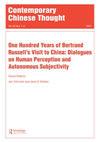Chen Shaoming on the Methodology of Chinese Philosophy: Experience, Imagination, Reflection
IF 0.4
3区 哲学
0 ASIAN STUDIES
引用次数: 0
Abstract
More than a decade ago, three consecutive issues of Contemporary Chinese Thought presented the papers of twenty-one Chinese scholars on the then hot topic of the “legitimacy of Chinese philosophy,” discussing whether or not Chinese masters were philosophers and, hence, ought to be taught at philosophy departments. Since the very lack of consensus on the definition of “philosophy” leads to fruitful debate in the field, the contributions to these three issues were themselves instances of philosophical reflection. Most inspiring were those that did not reduce the matter to merely proving (or disproving) that the label “philosophy” fits the early masters. There was a sense among most authors, including the co-editors, that this very question was doomed to lose its urgency—like medieval castles falling into ruins due to a lack of attention—as soon as more crucial issues would come to the foreground. One of these issues concerned the methodology for studying pre-modern Chinese texts: Which approach would do justice to the early Chinese masters and convince contemporary scholars of their relevance? One author who tackled this question was Chen Shaoming 陈少明. Born in 1958 in Guangdong, he spent two years of his youth (1975–1977) working in the countryside. This experience made him somewhat suspicious of grand theories, but all the more sensitive toward the vagaries of daily life. As soon as China opened up, he took the college entrance exams and, mistakenly, ended up at the history department of South China Normal University (Huanan shifan xueyuan) in the city of Guangzhou (1978–1983). This mistake turned out to be fortunate, since it sharpened his interest in concrete situations and shielded him from the ideological simplicities that dominated at philosophy departments. Shaped by countryside experiences and historical narratives, Chen then turned to the Philosophy department of Sun Yat-sen (Zhongshan) University, also in Guangzhou, to complete a master’s degree (1983–1986). He has stayed there ever since, notwithstanding some temporary visiting and teaching appointments at other places (Harvard University, Fudan University, Taiwan National University, Chinese University of Hong Kong). After several stays at Harvard and his work under the supervision of Tu Weiming in the first decade of this century, the tone in Chen’s work became more existential and was no longer dictated by Hegel and Kant. In 2004 he started the project Classics and Interpretation (Jingdian yu jieshi), which expanded his scope of interest and increased collaboration with colleagues in the field. His teaching and research have been on a wide variety of topics concerning early Chinese texts, especially Zhuangzi, the Lunyu, the Four Books, and the scholarship of late Qing and Republican scholars. In 2009 Guangdong province recognized him as a Pearl River Scholar (Zhujiang xuezhe). And in 2015 he received from the Ministry of Education the national honor of Yangtze Scholar (Changjiang xuezhe). none defined陈绍明论中国哲学方法论:经验、想象、反思
十多年前,《当代中国思想》连续三期发表了21位中国学者关于当时热门话题“中国哲学的合法性”的论文,讨论中国大师是否是哲学家,因此应该在哲学系教授。由于对“哲学”的定义缺乏共识,导致了该领域富有成果的辩论,对这三个问题的贡献本身就是哲学反思的实例。最鼓舞人心的是那些没有把这件事简化为仅仅证明(或反驳)“哲学”这个标签适合早期大师的人。包括联合编辑在内的大多数作者都有一种感觉,即一旦更关键的问题出现,这个问题就注定会失去紧迫性——就像中世纪的城堡因缺乏关注而变成废墟一样。其中一个问题涉及研究前现代汉语文本的方法论:哪种方法能公正地对待早期汉语大师,并使当代学者相信他们的相关性?陈少明是处理这个问题的一位作者陈少明. 1958年出生于广东,青年时期(1975年-1977年)有两年时间在农村工作。这段经历使他对宏大的理论有些怀疑,但对日常生活的变幻莫测更加敏感。中国一开放,他就参加了高考,并错误地进入了广州华南师范大学历史系(华南师范学院)(1978–1983)。这个错误被证明是幸运的,因为它提高了他对具体情况的兴趣,并使他免受哲学系主导的意识形态简单化的影响。在乡村经历和历史叙述的影响下,陈后来转到同样位于广州的中山大学哲学系攻读硕士学位(1983-1986)。此后,他一直留在那里,尽管在其他地方(哈佛大学、复旦大学、台湾国立大学、香港中文大学)有一些临时访问和教学预约。在本世纪的前十年,陈在哈佛大学呆了几年,并在屠指导下完成了他的作品,他的作品基调变得更加存在主义,不再受黑格尔和康德的支配。2004年,他开始了“经典与阐释”项目(经典于介石),这扩大了他的兴趣范围,并增加了与该领域同事的合作。他的教学和研究涉及中国早期文本,特别是《庄子》、《论说》、《四书》以及晚清和民国学者的学术。2009年广东省认定他为珠江学者(珠江学哲)。2015年获教育部长江学者国家荣誉称号。未定义
本文章由计算机程序翻译,如有差异,请以英文原文为准。
求助全文
约1分钟内获得全文
求助全文
来源期刊

CONTEMPORARY CHINESE THOUGHT
Multiple-
CiteScore
0.10
自引率
0.00%
发文量
0
期刊介绍:
This wide ranging journal is essential reading for anyone who wants to understand the diverse themes and influences that shape Chinese thought today. It features translations of the most current and influential Chinese writings on all aspects of philosophical endeavor, from theoretical essays on systems to studies of China"s cultural and religious development, from interpretations of the Chinese classics to exegeses on Marxist thought.
 求助内容:
求助内容: 应助结果提醒方式:
应助结果提醒方式:


